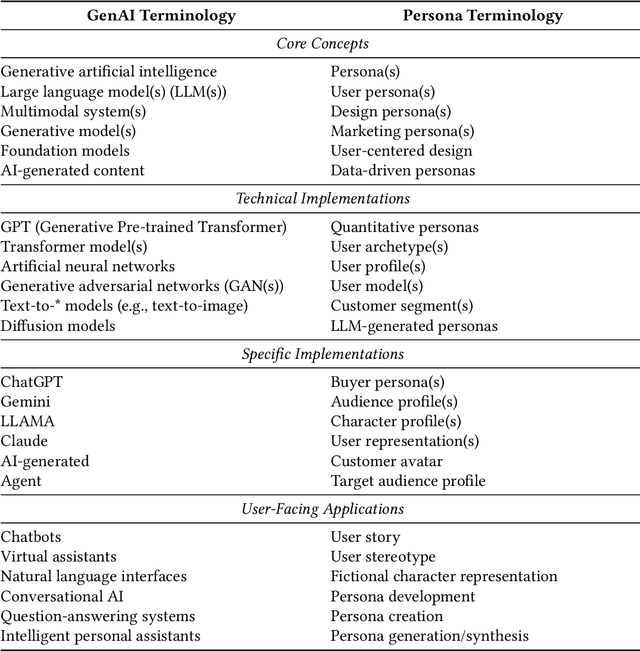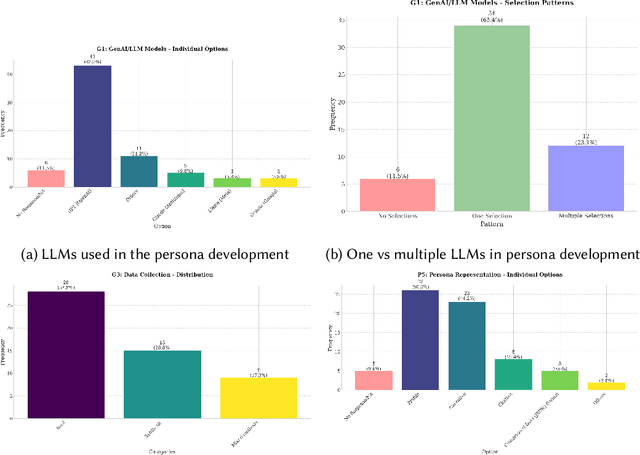Bernard J. Jansen
Lived Experience in Dialogue: Co-designing Personalization in Large Language Models to Support Youth Mental Well-being
Nov 07, 2025Abstract:Youth increasingly turn to large language models (LLMs) for mental well-being support, yet current personalization in LLMs can overlook the heterogeneous lived experiences shaping their needs. We conducted a participatory study with youth, parents, and youth care workers (N=38), using co-created youth personas as scaffolds, to elicit community perspectives on how LLMs can facilitate more meaningful personalization to support youth mental well-being. Analysis identified three themes: person-centered contextualization responsive to momentary needs, explicit boundaries around scope and offline referral, and dialogic scaffolding for reflection and autonomy. We mapped these themes to persuasive design features for task suggestions, social facilitation, and system trustworthiness, and created corresponding dialogue extracts to guide LLM fine-tuning. Our findings demonstrate how lived experience can be operationalized to inform design features in LLMs, which can enhance the alignment of LLM-based interventions with the realities of youth and their communities, contributing to more effectively personalized digital well-being tools.
How Is Generative AI Used for Persona Development?: A Systematic Review of 52 Research Articles
Apr 07, 2025



Abstract:Although Generative AI (GenAI) has the potential for persona development, many challenges must be addressed. This research systematically reviews 52 articles from 2022-2024, with important findings. First, closed commercial models are frequently used in persona development, creating a monoculture Second, GenAI is used in various stages of persona development (data collection, segmentation, enrichment, and evaluation). Third, similar to other quantitative persona development techniques, there are major gaps in persona evaluation for AI generated personas. Fourth, human-AI collaboration models are underdeveloped, despite human oversight being crucial for maintaining ethical standards. These findings imply that realizing the full potential of AI-generated personas will require substantial efforts across academia and industry. To that end, we provide a list of research avenues to inspire future work.
Kiss up, Kick down: Exploring Behavioral Changes in Multi-modal Large Language Models with Assigned Visual Personas
Oct 04, 2024



Abstract:This study is the first to explore whether multi-modal large language models (LLMs) can align their behaviors with visual personas, addressing a significant gap in the literature that predominantly focuses on text-based personas. We developed a novel dataset of 5K fictional avatar images for assignment as visual personas to LLMs, and analyzed their negotiation behaviors based on the visual traits depicted in these images, with a particular focus on aggressiveness. The results indicate that LLMs assess the aggressiveness of images in a manner similar to humans and output more aggressive negotiation behaviors when prompted with an aggressive visual persona. Interestingly, the LLM exhibited more aggressive negotiation behaviors when the opponent's image appeared less aggressive than their own, and less aggressive behaviors when the opponents image appeared more aggressive.
Random Silicon Sampling: Simulating Human Sub-Population Opinion Using a Large Language Model Based on Group-Level Demographic Information
Feb 28, 2024



Abstract:Large language models exhibit societal biases associated with demographic information, including race, gender, and others. Endowing such language models with personalities based on demographic data can enable generating opinions that align with those of humans. Building on this idea, we propose "random silicon sampling," a method to emulate the opinions of the human population sub-group. Our study analyzed 1) a language model that generates the survey responses that correspond with a human group based solely on its demographic distribution and 2) the applicability of our methodology across various demographic subgroups and thematic questions. Through random silicon sampling and using only group-level demographic information, we discovered that language models can generate response distributions that are remarkably similar to the actual U.S. public opinion polls. Moreover, we found that the replicability of language models varies depending on the demographic group and topic of the question, and this can be attributed to inherent societal biases in the models. Our findings demonstrate the feasibility of mirroring a group's opinion using only demographic distribution and elucidate the effect of social biases in language models on such simulations.
Aggregate effects of advertising decisions: a complex systems look at search engine advertising via an experimental study
Mar 04, 2022



Abstract:Purpose: We model group advertising decisions, which are the collective decisions of every single advertiser within the set of advertisers who are competing in the same auction or vertical industry, and examine resulting market outcomes, via a proposed simulation framework named EXP-SEA (Experimental Platform for Search Engine Advertising) supporting experimental studies of collective behaviors in the context of search engine advertising. Design: We implement the EXP-SEA to validate the proposed simulation framework, also conduct three experimental studies on the aggregate impact of electronic word-of-mouth, the competition level, and strategic bidding behaviors. EXP-SEA supports heterogeneous participants, various auction mechanisms, and also ranking and pricing algorithms. Findings: Findings from our three experiments show that (a) both the market profit and advertising indexes such as number of impressions and number of clicks are larger when the eWOM effect presents, meaning social media certainly has some effect on search engine advertising outcomes, (b) the competition level has a monotonic increasing effect on the market performance, thus search engines have an incentive to encourage both the eWOM among search users and competition among advertisers, and (c) given the market-level effect of the percentage of advertisers employing a dynamic greedy bidding strategy, there is a cut-off point for strategic bidding behaviors. Originality: This is one of the first research works to explore collective group decisions and resulting phenomena in the complex context of search engine advertising via developing and validating a simulation framework that supports assessments of various advertising strategies and estimations of the impact of mechanisms on the search market.
* 26 pages, 7 figures, 5 tables
Keyword Optimization in Sponsored Search Advertising: A Multi-Level Computational Framework
Feb 28, 2022



Abstract:In sponsored search advertising, keywords serve as an essential bridge linking advertisers, search users and search engines. Advertisers have to deal with a series of keyword decisions throughout the entire lifecycle of search advertising campaigns. This paper proposes a multi-level and closed-form computational framework for keyword optimization (MKOF) to support various keyword decisions. Based on this framework, we develop corresponding optimization strategies for keyword targeting, keyword assignment and keyword grouping at different levels (e.g., market, campaign and adgroup). With two real-world datasets obtained from past search advertising campaigns, we conduct computational experiments to evaluate our keyword optimization framework and instantiated strategies. Experimental results show that our method can approach the optimal solution in a steady way, and it outperforms two baseline keyword strategies commonly used in practice. The proposed MKOF framework also provides a valid experimental environment to implement and assess various keyword strategies in sponsored search advertising.
* 21 pages, 3 figures,1 table
 Add to Chrome
Add to Chrome Add to Firefox
Add to Firefox Add to Edge
Add to Edge